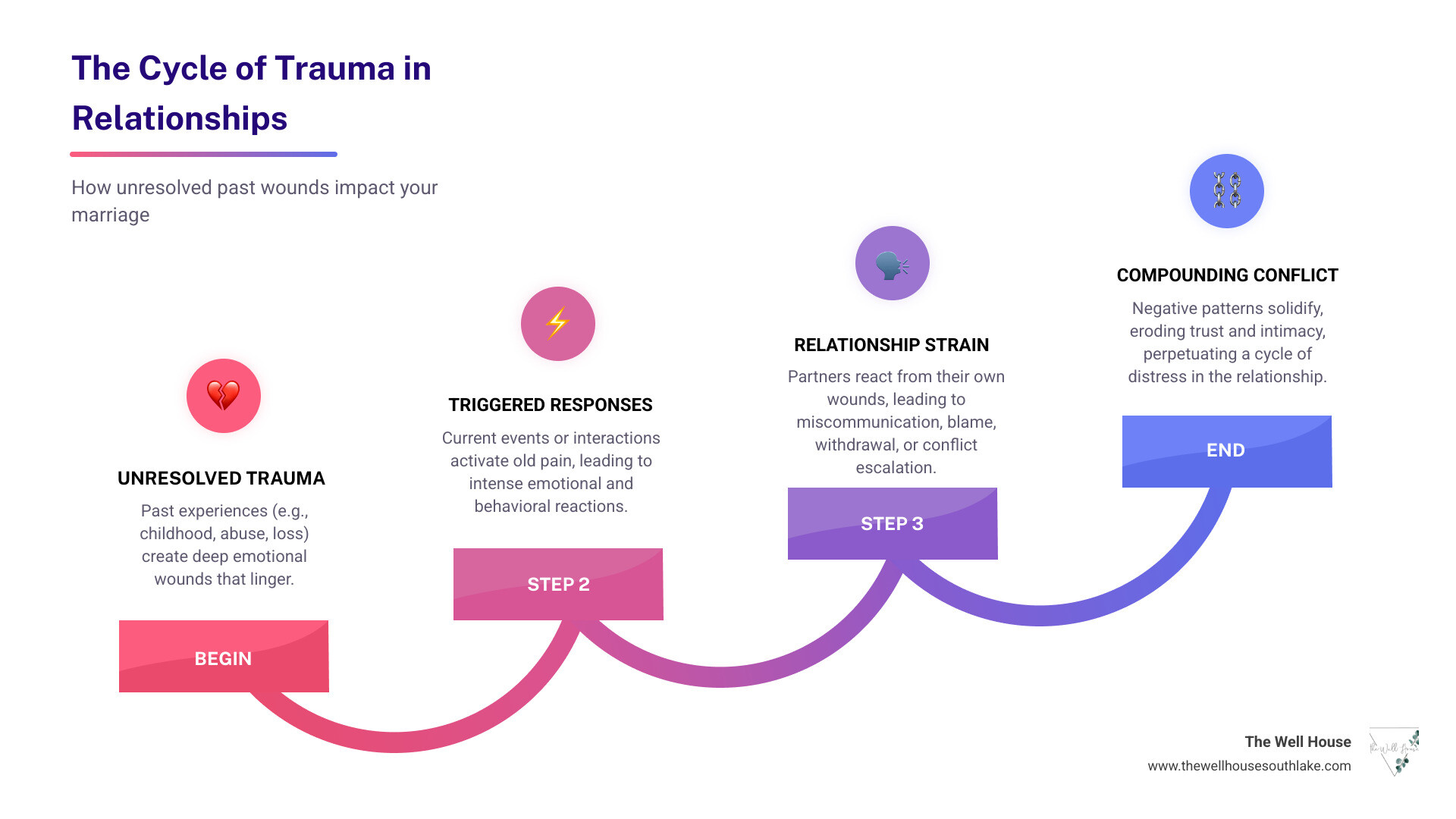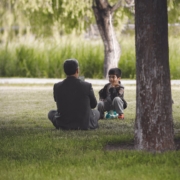From Hurt to Healing: A Guide to Trauma-Informed Marriage Counseling
Why Trauma-Informed Marriage Counseling Can Transform Your Relationship
Trauma-informed marriage counseling offers hope for couples struggling with unresolved pain. This specialized approach recognizes that past wounds often show up in our closest relationships in unexpected ways. It’s a therapeutic method that addresses how past traumatic experiences impact current relationship dynamics, focusing on safety and understanding rather than just changing behaviors.
When we have big emotional reactions to seemingly small issues, it’s often our past speaking louder than our present. As one psychology expert puts it, “If it’s hysterical, then it’s historical.”
Trauma is more common than we think. Studies show that marginalized communities, including LGBTQIA+ individuals, Black individuals, and immigrant families, experience trauma at disproportionately high rates. Many people carry these wounds without a formal PTSD diagnosis, yet they still impact their relationships.
The good news is that your relationship can become a place of healing. By understanding trauma responses together, couples can break negative cycles and build the secure partnership they deserve. Key benefits include:
- Improved communication and emotional regulation
- Deeper understanding of each other
- Rebuilding trust and intimacy
- Breaking cycles rooted in past pain
At The Well House, our counselors specialize in helping couples steer the complex intersection of past wounds and present love. We’ve witnessed how this approach can transform relationships from sources of pain into foundations of strength.

Trauma informed marriage counseling glossary:
The Unseen Guest: How Past Trauma Shows Up in Your Marriage
Past traumas, both big and small, can act like an unseen guest in your marriage, impacting your present relationship even if the memories are suppressed. When one or both partners carry unresolved trauma, it can trigger intense emotional reactions that seem disproportionate to the current situation. As the saying goes, “If it’s hysterical, then it’s historical.”
These past wounds can profoundly impact the foundations of a healthy relationship:
- Trust: Relational trauma can make it incredibly difficult to form secure bonds, leading to hypervigilance and a fear of betrayal.
- Communication: Trauma can cause one partner to shut down or withdraw when triggered, while the other might become critical, creating a cycle of misunderstanding.
- Intimacy: The fear of vulnerability can lead to emotional and physical distancing, leaving both partners feeling alone.
- Emotional Reactions: Unresolved childhood traumas can resurface during arguments, causing disproportionately large reactions that are about old wounds being reactivated.
These issues can erode a marriage over time, but there is hope for healing.
Common Signs Trauma is Affecting Your Relationship
Recognizing the signs that trauma is impacting your marriage is the first step. If you observe these patterns, trauma informed marriage counseling could be beneficial:
- Frequent and Intense Conflict: Small disagreements quickly escalate into major fights that rarely get resolved.
- Emotional Shutdown or Withdrawal: One or both partners disengage, go silent, or leave during conflict.
- Trust Issues: A persistent inability to fully trust your partner, often stemming from past betrayals.
- Avoidance: Actively avoiding certain topics, activities, or physical closeness.
- Intense Emotional Triggers: Seemingly small things cause an immediate and intense emotional reaction.
- Difficulty with Intimacy: A noticeable decline in emotional or physical closeness and connection.
- Coping Mechanisms: Using substances, work, or other behaviors to numb pain or avoid difficult emotions.
- Recurrent Negative Patterns: Feeling stuck in the same destructive cycles of interaction.
- Negative Self-Image: Feelings of shame or worthlessness that make it hard to give or receive love.
Who is Affected by Trauma?
Trauma is widespread and can stem from many sources, including chronic relational issues, abuse, neglect, and systemic aggressions. In the U.S., the statistics are telling:
- Almost 50 percent of children have had at least one significant traumatic experience.
- 60 percent of adults report at least one adverse childhood experience (ACE). You can find out more about the ACEs here)
Certain communities face disproportionately higher rates of trauma due to systemic issues:
- LGBTQIA+ Individuals: Experience PTSD at much higher rates than their cis, heteronormative peers. Statistics on trauma in LGBTQIA+ individuals
- Black Individuals: Maintain the highest prevalence of PTSD compared to other races, often tied to racism and historical trauma. Statistics on trauma in Black individuals
- Immigrant and Neurodivergent Populations: Also face unique and compounded traumas.
Many people carry these invisible wounds without a formal diagnosis, which is precisely what trauma informed marriage counseling is designed to address.
What is Trauma-Informed Marriage Counseling and How Does It Work?
Trauma informed marriage counseling is a specialized approach that understands how past hurts affect present relationships. It’s not about blame; it’s about exploring how your personal histories influence your life together. This approach shifts the question from “What’s wrong with you?” to a more compassionate “What happened to you?”
This change in perspective helps us see that difficult behaviors are often coping mechanisms learned from past experiences. Our primary goal is to create a safe space for both partners to open up, understand their triggers, and process old wounds without fear. This understanding is the first step toward building healthier ways of interacting. You can learn more about our broader Counseling for Trauma services.
How It Differs from Traditional Couples Therapy
While traditional therapy often focuses on current communication skills, trauma-informed therapy digs deeper to understand why communication gets stuck. It looks at the root causes of conflict, often found in past experiences.
Here’s a quick look at some key differences:
| Feature | Traditional Couples Therapy | Trauma-Informed Couples Therapy |
|---|---|---|
| Primary Focus | Current relationship dynamics, communication patterns, conflict resolution, problem-solving. | Root causes of relationship issues, individual trauma histories, nervous system regulation. |
| View of Problems | Often seen as issues of skill deficits (e.g., poor communication) or personality clashes. | Behaviors and patterns are understood as adaptive responses to past trauma. |
| Therapist’s Role | Facilitates communication, teaches skills, mediates conflicts, helps set goals. | Creates a safe and stable environment, provides psychoeducation on trauma, guides processing. |
| Emphasis | Changing behaviors, improving interactions, finding compromises. | Healing underlying wounds, building internal and relational safety, understanding triggers. |
| Pace of Therapy | Can be more direct and solution-focused; may move quickly to problem-solving. | Prioritizes safety and stabilization; proceeds at the client’s pace to avoid re-traumatization. |
| Key Question | “What’s wrong with your communication?” “How can you resolve this conflict?” | “What happened to you?” “How does your past influence your present reactions?” |
Trauma informed marriage counseling integrates trauma theory, attachment theory, and relational psychology to heal the deep-seated issues that disrupt trust and communication, rather than just patching over them.
Marriage Counseling and Couples Therapy
Specialized trauma-informed counseling to support couples through emotional challenges. Book today.
Core Principles and Benefits of a Trauma-Informed Approach
Our approach is built on core principles that guide the healing process: Safety, Trustworthiness, Collaboration, Empowerment, and Cultural Sensitivity. We work to create a secure environment where you feel respected, heard, and empowered to participate actively in your healing journey.
The benefits of this approach are transformative and go beyond just solving arguments:
- Improved Communication: Learn to express yourselves and listen in healthier ways. For more tips, see Communicating with Your Partner for Better Connection.
- Rebuilding Trust: Address the root causes of mistrust to build a strong foundation of security.
- Greater Empathy: Gain insight into how past experiences shape present behaviors, moving from blame to compassion.
- Improved Emotional Regulation: Learn to spot triggers and manage strong emotions, leading to less reactivity.
- Strengthened Connection: Feel safer and more understood, allowing you to grow closer and build profound intimacy.
- Improved Self-Worth: Healing from trauma helps you refind your true self, which positively impacts the relationship.
- Breaking Generational Cycles: By healing trauma in your marriage, you can stop unhealthy patterns from being passed down.
The Healing Journey: What to Expect from Therapy
Starting trauma informed marriage counseling is a courageous step. At The Well House, we act as your guides, helping you explore your story without judgment. Our first priority is creating a safe space where you both feel secure enough to be vulnerable.
We help you understand how past experiences shaped your current coping mechanisms, shifting the focus from blame to compassion. A key part of our approach is teaching co-regulation, where you learn to become sources of calm and security for each other. This builds resilience and a deeper connection, often integrating principles from Emotionally Focused Couples Therapy to heal attachment wounds.
The Three Stages of Trauma Recovery in Couples Therapy
We adapt Dr. Judith Herman’s three-stage model for couples. Healing is rarely linear, and these stages often overlap.
Stage 1: Safety and Stabilization
This foundational stage is about creating emotional safety before addressing deeper wounds. We help you interrupt destructive patterns and teach practical skills for emotion regulation, such as grounding techniques and taking effective time-outs. The goal is to establish a sense of predictability and trust, creating solid ground for the work ahead.
Stage 2: Remembrance and Mourning (Processing)
Once you feel more stable, we gently explore how past experiences impact your relationship. This is not about reliving trauma but understanding its effects. You’ll share your stories in a supported way, making connections between past wounds and current patterns. This stage fosters deep empathy as you learn to see each other’s behaviors through the lens of survival.
Stage 3: Reconnection and Integration
The final stage focuses on building the relationship you both want. You’ll practice healthier communication and conflict resolution skills, rebuilding trust and intimacy through consistent, responsive actions. Together, you create a new story of resilience and growth, where your trauma is part of your history but no longer defines your future.
Effective Strategies for Healing Together
We use various proven strategies custom to your unique needs:
- Psychoeducation: We teach you how trauma affects the brain and body, which reduces shame and builds empathy.
- Emotion regulation techniques: You’ll learn practical skills like breathing exercises and grounding to manage overwhelming feelings.
- Narrative therapy: We guide you in safely sharing your stories to make sense of past events and how they shaped you.
- Attachment-focused interventions: We explore how early relationships created your “relationship blueprint” and help you build more secure ways of connecting.
- Somatic techniques: We address how trauma is held in the body, teaching body awareness and nervous system regulation.
- Co-regulation strategies: You’ll learn to be each other’s emotional anchors, responding with calm presence.
- EMDR therapy: This can be helpful for processing individual trauma that affects the relationship. Learn more about EMDR Therapy: How Does It Work?.
Identifying and Managing Triggers as a Team
Triggers are emotional alarm systems that link the present to past danger. Learning to manage them as a team is a powerful part of healing.
This process involves understanding your own triggers and learning your partner’s with compassion. Together, you can create a trigger management plan with agreed-upon signals for when you feel overwhelmed, like asking for a pause.
We teach grounding techniques to bring you back to the present moment and mindful communication to help you express feelings without blame. The goal is to support each other without judgment, recognizing that a triggered reaction is about history, not the current situation. This transforms triggers from sources of conflict into opportunities for deeper connection.
Book Trauma-Informed Marriage Counseling
Contact our Southlake therapists for guidance in healing and strengthening your relationship.
Frequently Asked Questions about Trauma-Informed Marriage Counseling
It’s natural to have questions when considering trauma informed marriage counseling. Here are answers to some of the most common concerns we hear.
How long does trauma-informed marriage counseling take?
There’s no simple answer, as therapy is not a quick fix. The length of counseling depends on your unique history, patterns, and goals. We’re focused on creating lasting change, not temporary relief. Therapy moves at a pace that feels safe and manageable for you, never rushing the process. Some couples see significant improvement in a few months, while those with more complex histories may benefit from longer-term support. The most important thing is that the plan fits your needs.
Can we do this if only one of us has experienced trauma?
Absolutely. Trauma affects the entire relationship system. When one partner carries unhealed wounds, it impacts communication, trust, and intimacy for both. This counseling is valuable for the non-traumatized partner, as it teaches you how to be a source of safety and support rather than accidentally triggering old wounds. It helps both of you understand the dynamic and develop healthier ways of connecting. A relationship can be a powerful place of healing when both partners are involved in the process.
What if talking about the trauma is too painful?
This is a valid and common fear. In trauma informed marriage counseling, your safety is our top priority. We never force you to talk about anything you aren’t ready to discuss. You are always in control.
We begin by building your coping skills and ability to manage difficult emotions—what we call your “window of tolerance.” We teach grounding techniques and regulation skills first, ensuring you feel stable and secure before approaching deeper topics. The process is gradual and respects your pace. Healing unfolds naturally, without pressure or judgment.
Insurance & Payment Options at The Well House Southlake
At The Well House Southlake, we understand that healing from trauma is a deeply personal journey that can significantly impact your relationship. That’s why we offer marriage counseling that takes insurance, making it easier for you and your partner to access the support you need.
We currently accept:
- Blue Cross Blue Shield (BCBS)
- Aetna
- UnitedHealthcare (UHC)
- Self-Pay and Out-of-Network Options
If you’re searching for couples counseling covered by insurance, our team is here to assist you in verifying your benefits and scheduling your sessions. We aim to make the process as seamless as possible so you can focus on rebuilding trust and intimacy in your relationship.
Your Path Forward: Rebuilding a Strong and Healthy Partnership
Choosing trauma informed marriage counseling is a courageous step that shows your commitment to your relationship’s future. It’s about turning hidden challenges into opportunities for a deeper, more meaningful bond.
We’ve seen many couples in Southlake, Westlake, Grapevine, Roanoke, and Trophy Club, TX, move from conflict and distance to a place of understanding, trust, and vibrant connection. At The Well House, we believe in the power of healing together. Our holistic mind-body-spirit approach ensures you feel supported every step of the way.
Your relationship doesn’t have to be defined by the past; it can become the safe space where true healing begins. If you and your partner are ready to begin this journey, we are here to guide you toward building a strong, healthy, and lasting partnership.
Ready to learn more? Find our Marriage Counseling and Couples Therapy services and see how we can support your unique path to healing.













